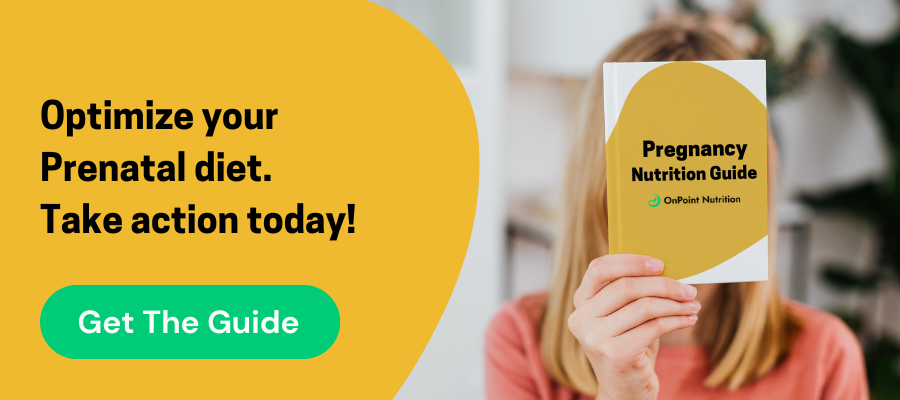
Optimizing your nutrition during pregnancy is important for both moms-to-be and your baby. While there isn’t a magic formula for perfect pregnancy nutrition, including key foods and beneficial nutrients will help nourish you and your baby through this important time in both of your lives.
Eating a well-balanced diet is ideal for everyone, but even more important during pregnancy. In general, focus on eating a varied diet that contains nutrient-dense foods such as fruits, vegetables, complex carbohydrates, lean proteins, and healthy fats.
Fruits and Vegetables for Pregnancy
Fruits and vegetables provide your body with a wide variety of vitamins and minerals to maintain the health of both mom and baby. Both food groups are also dense sources of fiber, which helps maintain proper digestion and prevents constipation, which can occur during pregnancy. Incorporate as many different colors of fruits and vegetables as possible, and be sure to wash all produce before consuming.
Complex Carbohydrates for Pregnancy
Complex carbohydrates are also great sources of fiber. They contain iron, B vitamins, and folate, which are all key nutrients during pregnancy. Complex carbohydrates, as opposed to simple refined carbohydrates, can also aid in maintaining steady blood sugar throughout the day. Include whole grains, potatoes and sweet potatoes, and beans in your diet to provide your body with these essential nutrients.
Lean Proteins for Pregnancy
Protein is important for the growth and development of your baby. Protein also provides your body with the extra energy needed to grow and develop your baby. More specifically, protein is key to the development of your baby’s heart and brain. Include a variety of protein sources, as tolerated throughout each day.
Healthy Fats for Pregnancy
The healthy fats found in foods such as avocados, nuts, seeds, fish, and healthy oils are key to your baby’s brain development. Whenever possible, try to consume unsaturated fats in place of saturated fats. For example, use olive oil or avocado oil in place of butter, or choose fatty fish like salmon in place of a high-fat cut of red meat.
Water
It goes without saying that everyone should drink water. However, when pregnant, your hydration needs to increase. This increase is due, in part, to the increase in blood volume needed to support you and your growing baby. Consuming more water, along with enough fiber, is the best way to prevent constipation. The general guideline for pregnant women is to consume at least 80 ounces of water daily, but it is best to discuss your individual needs with your doctor or dietitian.
Micronutrients
Micronutrient is a fancy name for vitamins and minerals. While all vitamins and minerals are important for optimal health, certain micronutrients are essential for a healthy pregnancy.
- Vitamin A is required for your baby’s development, specifically for the eyes and immune system.
- Vitamin D is key for your baby’s bone development.
- Calcium works with vitamin D and is needed for your baby’s teeth, bones, muscles, heart, and nerves.
- Choline is important for your baby’s brain development.
- Folate is also needed for your baby’s developing brain and spinal cord.
- Iron supports your increased blood supply as a mom-to-be.
Your doctor will likely recommend taking prenatal vitamins to ensure you are getting an adequate amount of these vitamins and minerals, as well as all other micronutrients.
Let's Get Specific
While the information above is helpful to guide your overall choices, having clear ideas of what to eat can help you decide what exactly to pick during pregnancy. Try including the foods below on a daily or weekly basis.
- Dark and leafy green vegetables, including spinach, kale, and broccoli, are great for pregnancy. These vegetables contain calcium, folate, iron, and fiber. Additionally, they contain vitamins A and C. While these vegetables are rich in many nutrients, any vegetables you eat are going to benefit both you and your baby. Aim for a wide variety of vegetables throughout your pregnancy.
- Berries are good sources of fiber, vitamin C, and antioxidants. While all fruits are healthy to consume during pregnancy, berries are especially nutrient-dense.
- Oranges, grapefruits, and other citrus fruits are dense sources of folate and another great group of fruits to include during pregnancy.
- Whole grains, including brown rice, quinoa, oats, and whole wheat bread and pasta, are good sources of fiber. These grains also contain various B vitamins. Grains are also usually well-tolerated when battling pregnancy nausea and can help you meet your energy needs each day (link nausea during pregnancy blog).
- Fortified grains are grains with added nutrients to help you hit your nutrient goals. These grains often contain calcium, folate, iron, and fiber.
- Sweet potatoes are complex carbohydrates packed with fiber and vitamin A.
- Beans and lentils provide the body with fiber, protein, calcium, folate, and iron.
- Lean meats and poultry are dense protein, choline, and iron sources.
- Eggs are also high in protein and choline and vitamin D.
- Dairy products provide your body with protein, calcium, and vitamin D. Yogurt is a particularly strong source of protein.
- Fish, specifically salmon and other fatty fish, contain omega-3 fatty acids for your baby’s brain development. They are also good sources of protein, calcium, and vitamin D. Please note that some fish are more likely to contain high levels of mercury and should be limited during pregnancy (add link to foods to avoid during pregnancy blog).
- Avocados also provide the body with healthy fats, in addition to fiber and folate.
- Nuts are good fiber, protein, healthy fats, and calcium sources. Peanuts are specifically high in folate.
Your Pregnancy
It is important to note that everybody reacts differently to pregnancy. Using the information above to guide your decisions is a great place to start. Listening to your body throughout pregnancy is also key to having a healthy pregnancy. If any of these foods do not work for you in this stage of life, do not stress. Simply talk with your doctor or dietitian about how to get in the nutrients you and your baby need.
Topics

Britney Kennedy is the founder and CEO of OnPoint Nutrition. Since opening in 2016, she and her team have helped over 2,500 individuals become happier, healthier more confident versions of themselves.




